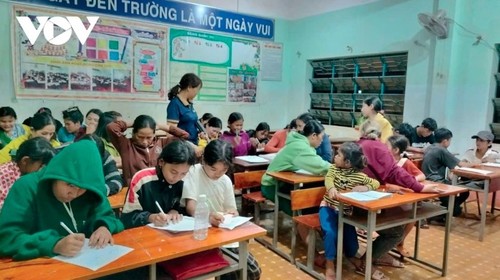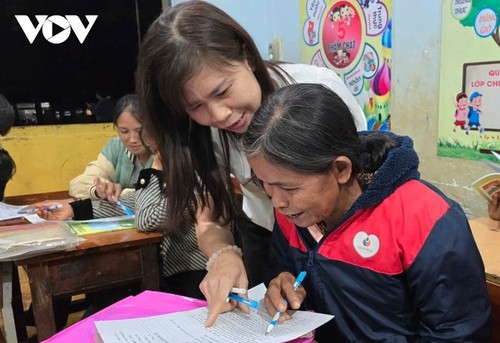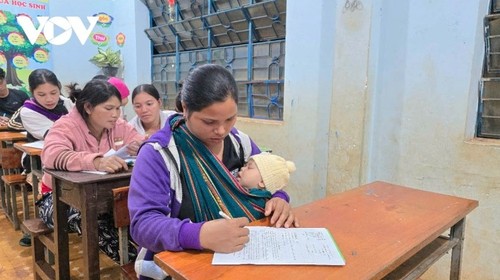 The literacy class at Tran Phu Primary School has 40 ethnic minority members. The literacy class at Tran Phu Primary School has 40 ethnic minority members. |
Every evening from Monday to Friday for the past three months, a literacy class has been taught at Tran Phu Primary School for 40 ethnic minority adults from Ia Dom commune, Duc Co district.
The oldest student, Siu H’Phem of Mok Den 2 village, is 54 years old. She said that, despite her age and poor learning capacity, she diligently attends class every day. Through perseverance, she can now read and write her own name.
H’Phem told VOV, “I attended school 30 years ago, but had to drop out to get married and give birth. Poverty prevented me from returning to school and I became illiterate again. Thanks to this class and the teachers’ encouragement, I’m determined to learn to read and write.”
 Most of the participants are adults. Most of the participants are adults. |
Carrying her five-month-old baby on her back, Ro Mah H’Voi of Mok Den 1 village listens attentively to the teacher. 26-year-old H’Vo has three children and a difficult life. Learning is an opportunity to change her circumstances, so H’Vo tries to attend class every night even though she lives 10km from the school.
“I want to go to school so I can sign my name when completing forms. I’m so happy that the government opened this literacy class. The teachers are enthusiastic. I study hard so I can teach my children and help others,” said H’Vo.
Teacher Truong Thi Cuc says she tries to be patient with the students, who are mostly farmers. She uses her own methods to teach them the alphabet, then how to combine the letters to make words.
She said all the teachers are glad that the students are eager about attending the class, adding, “They want to learn, so when the teachers teach, they pay close attention. Most of the students are from poor households and really want to escape illiteracy. Teaching has to be adjusted to each student’s abilities, which makes it more difficult for the teachers.”
 Each student has a different situation, but they all try to attend the class regularly with the desire to be literate to escape poverty. Each student has a different situation, but they all try to attend the class regularly with the desire to be literate to escape poverty. |
Phan Thi Tam, who has taught literacy classes for many years, said it’s difficult to maintain the number of participating students. The teachers often have to go to a student’s house to persuade them to come to class. Tam told VOV that in the second semester, just when the students are beginning to read and write, they take a break to work in the fields.
“Some young people of working age go to another province to work, so the number of students decreases. It’s difficult to persuade some people to attend the class because they come home late from work and can’t afford the fuel to come to school on a motorbike. We either give them some money or give them a ride to school. We use every way we can to get them to attend class regularly,” according to Tam.
Pursuant to the illiteracy eradication program from 2021 to 2025, Duc Co district has opened 20 literacy classes for 600 students, established a steering committee for universal illiteracy eradication, and assigned responsibilities to members by area.
Siu Luynh, Deputy Chairman of the Duc Co district People's Committee, said, “When people can read and write, it’s much easier to disseminate policies to them and protect their legitimate rights.”
“We find that elderly people who can read and write are happier. It’s easier for the local government to communicate with people and get them to participate in projects,” Siu Luynh said.